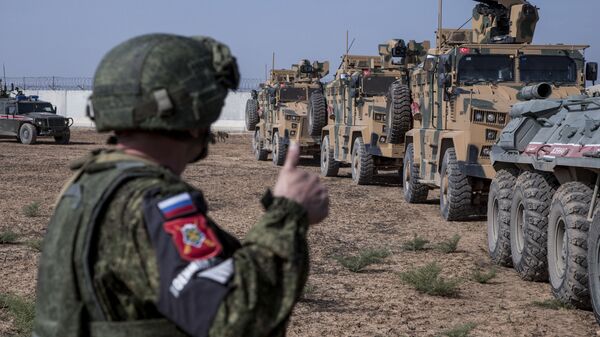On 5 March, Russian President Vladimir Putin and his Turkish counterpart Recep Tayyip Erdogan struck an agreement that envisages a ceasefire in Syria’s Idlib province beginning 6 March.
However, US Special Representative for Syria Engagement James Jeffrey threw the rationale of the truce into doubt, claiming that Turkey is the only power that should draw a hard line in the conflict over Idlib. According to the ambassador, the US should throw its weight behind Turkey since the Turks "cannot back down" if the standoff reignites, "or they will have 3 million new refugees".
Earlier, Turkey requested that the US deploy two Patriot missile defence batteries on its southern border and asked NATO to maintain a no fly zone over northern Syria. However, neither the US nor NATO provided immediate assistance to their ally.
'US Words Don't Materialise Into Actions'
Over the recent weeks, the US has jumped at the opportunity "to re-insert itself as a major player in Syria and improve its relationship with Ankara", says Yusuf Erim, political analyst for Turkey’s state-run broadcaster TRT World. However, it has been all talk and no action, according to the journalist.
"If the US or NATO had answered Turkey's call for a no-fly zone or sent Patriot missiles to the border, we would be looking at a different situation on the ground with the scales heavily tipping towards the Turks", he suggests.
The political analyst highlights that the main outcome of the talks between Vladimir Putin and Recep Erdogan is "compromise". Turkey and Russia "both got what they needed and that's a ceasefire", Erim notes.
"Once again Moscow and Ankara have reached an important agreement on Syria with Washington and Brussels staring from the sidelines", he stresses.
Tulin Daloglu, a publisher and expert on US-Turkey relations, opines that the "Americans would not wish Turkey to continue having a good standing with Russia, and could even see benefit if the situation gets out of control in Idlib", adding that Washington is reportedly considering providing Patriot air defence systems to Ankara.
On 4 March, al-Monitor cited Under Secretary of Defence for Acquisition and Sustainment Ellen Lord as saying that the Patriots are still on the table in the Pentagon-Ankara talks. The next day Erdogan confirmed that Ankara is still requesting the air defence systems from the US.
A Shift in Idlib Strategy?
Dr Ardian Shajkovci, a lecturer and security analyst with field research experience in the Middle East, believes that there is a shift in strategy towards the situation in Idlib by both the United States and Russia. According to him, "they accept and justify Turkey’s military actions in Idlib and in securing its security perimeters in Idlib".
"From a US standpoint, I see the developments as a proactive approach to prevent a spill-over of violence across border into Turkey and beyond", he says. "This will be crucial for the United States to show its seriousness in dealing with the internal conflict in Syria as well as the impact of such [a] conflict on neighbouring states".
He foresees that the US "is likely to remain engaged with Turkey" as the political status of Idlib "remains contentious", according to the analyst.
"In addition, the US and Western governments, because they are not militarily involved in the country, will remain with limited, direct influence of the situation on the ground", Shajkovci predicts.
The hostilities between the Turkish and Syrian militaries escalated last month over Damascus' counter-terror operation in the province that hit Turkish military personnel amid the crossfire. According to the Russian Defence Ministry, Turkish forces were not supposed to be in the area targeted by the Syrian Army’s fire in response to attacks by terrorists.
Following the clashes last week, which resulted in the deaths of over 30 Turkish troops, Ankara kicked off Operation Spring Shield, striking Syrian forces and equipment. Under the new Russo-Turkish agreement, Ankara will deploy additional forces in Idlib province, but the status of Operation Spring Shield will be changed.




